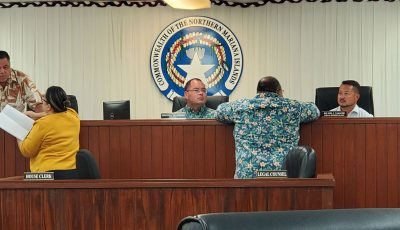Power sharing
By HAIDEE V. EUGENIO
Special to the Saipan Tribune
An informal agreement reached on the eve of the 19th House of Representatives’ inaugural session averted a leadership crisis in the short term, but this sharing of the speakership between Rep. Joseph Deleon Guerrero (Ind-Saipan) and Rep. Ralph Demapan (R-Saipan) is not necessarily the best compromise to stabilize an almost divided chamber.
Under what Deleon Guerrero himself described as a “unique and unprecedented arrangement,” he serves as speaker starting on Jan. 12, 2015, and will pass on the leadership to vice speaker Demapan on the second Monday of January 2016. No re-vote is expected.
But once this arrangement is tampered with, it becomes a source of more tension and conflict. As it is now, the House is almost split in the middle. And the split is almost between those who supported the Inos-Torres gubernatorial tandem and those that backed the Hofschneider-Yumul team led by Rep. Ray Tebuteb (Ind-Saipan), as well as the differing views mainly on the Saipan casino bill.
Tebuteb’s team then becomes the minority or opposition bloc, which strives to become the true “voice of reason” and ensure that the House and the Senate do not become a rubber stamp Legislature to the Inos administration. The House leadership is aligned with the Inos-Torres administration, and so is the Senate leadership. Lt. Gov. Ralph Torres was instrumental in the leadership compromise reached.
Some believe that a Tebuteb speakership could pave the way for the repeal of the Inos-backed Saipan casino law, among other things, although there is hope that being a minority bloc don’t necessarily mean being obstructionists.
Deleon Guerrero, in his inaugural session remarks, asked his colleagues to have confidence that he can work with each and every one of them.
“I think if I was asked what is my strength, it would be the long-term relationships I created with people and trying to improve on those relationships. You may call it politics or call it as you may, but it can work. It’s a two-way street, of course. If we can come on board with the same attitude of working together as said by every member I heard, I too have optimism that great things would happen,” the speaker said.
But then again, it took two months for 20 elected officials to choose their speaker. That does not bode well for the legislative process—introducing new bills, amending existing laws, holding public hearings on bills, debating them, voting on them or shelving them, and passing a balanced budget on time to avoid a government shutdown.
Part of the process, too, is making sure special interest bills do not pass the Legislature, and that bills go through public hearings and properly debated before any voting.
In the 18th House of Representatives, at least 212 bills got introduced and only a few underwent public hearings. The exclusive Saipan casino license bill itself passed the House and Senate without public hearings and then became law, whereas less-impact bills got public hearings but not until close to the November 2014 elections as last-ditch effort to get votes. During the 18th Legislature, 68 bills introduced became law and 49 of them originated from the House.
Prior to reaching a last-minute compromise, Deleon Guerrero only had four expected votes while Demapan had seven and Tebuteb had nine. Only those supporting Deleon Guerrero and Demapan were at the meeting to try to break the deadlock so it didn’t come as a surprise that Tebuteb’s team was left out of the pre-arranged leadership, though he would have only needed two additional votes to win the speakership.
“It could have gone either way. Tebuteb’s group could have joined Deleon Guerrero’s group or Demapan’s group. It was just a matter of majority rather than issues at the time…It allows for more ability to pass legislation,” one of the members of the GOP-Independent coalition said after the fact.
Being a member of the majority almost always means a member’s bill gets passed more easily than those introduced by minority members. As one member puts it, “It’s not impossible to pass legislation as a minority. It just takes a little more persuasion.”
In the end, whether this shared speakership will unify or completely split the 19th House of Representatives will depend on each of the 20 members’ sound judgment, commitment to protect public interest and the ability to work together regardless of personal issues and political affiliations. But lawmakers have a record of unsound judgment, putting personal over public interest first and not getting past personal issues.
Haidee V. Eugenio is a veteran journalist in the CNMI.



























